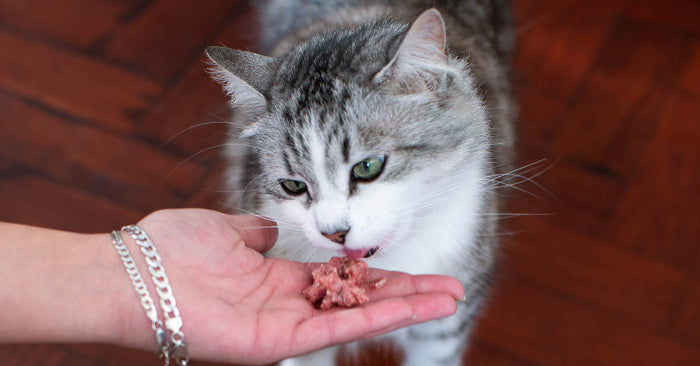Why Are Cats Fussy Eaters? You’re Not Alone!

If you thought it was just your cat, we’re here to bring you some relief. We’ve known many tentative new customers who give up on raw after one or two tries, saying their cat is just too “fussy”, “stubborn”, or “finicky” about their food. The truth is yes, cats are particular about what they eat. They have good reason for this. But that doesn’t mean they won’t change. Let’s have a bit of a closer look at the evolutionary and biological reasons that a cat won’t wolf down anything you put in front of it without hesitation. Once you understand where your cat is coming from, it will be so much easier to help them learn new and better habits.
Mother Knows Best
Domestic cats are directly descended from wild cats. In the wild, cubs have to learn how to hunt, but even before that they have to learn to differentiate food from non-food. Helpless and adorable as they are at the start, they rely entirely on their mothers to kill their prey and deliver it to them. If Mom brings it, it must be food and it must be safe. They lock in the details of their mothers’ food choices pretty early, and this sets them up for a lifetime of safe eating.

This has pros and cons for the domestic kitty. Their biological programming means that whatever meals your cat got used to as a kitten is what they will associate as food. The younger your cat is when they are introduced to raw food, the quicker and smoother the transition will be, because they won’t be as rigid in their food choices yet. An older cat may take a while to even recognise the new food as food at all. Don’t despair though - you can teach an old cat new tricks, it just takes a little extra patience!
Fresh Meat
Wild cats bodies were designed to eat fresh meat, still warm from the hunt, just as their mothers would have brought it to them. This is why some cats refuse to eat their raw food straight out of the fridge, and prefer it at room temperature, freshly defrosted. They are not natural scavengers, and have a very heightened sense of smell and taste. This is to protect them from eating spoiled or contaminated meat in the wild. This can even make them particular about which proteins they will eat. For some, the smell of ostrich (for example) is too strong, even if the meat is perfectly fresh. That’s why, as much as variety is wonderful, we encourage new raw feeders to ease their kitties in, one protein at a time, and accept it without complaint if their cat chooses a favourite and sticks with it.

Applying This to Your Kitty
Now that you know cats learn about food from their mothers, you can use that to your advantage. If you’ve tried all our other tips and tricks for switching cats to raw food and nothing has worked yet, remember that you are their trusted human parent. Try feed them the raw food by hand – your familiar smell will help them trust that this food is worth a try. Once they’ve acclimatised to it they will happily lick any bowl clean!


